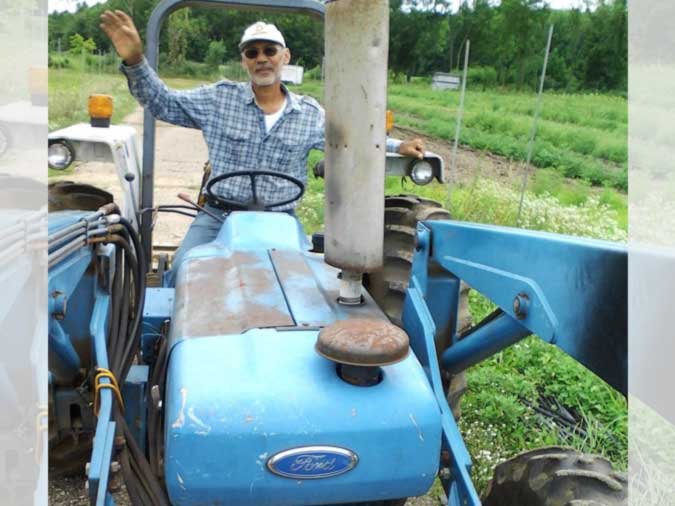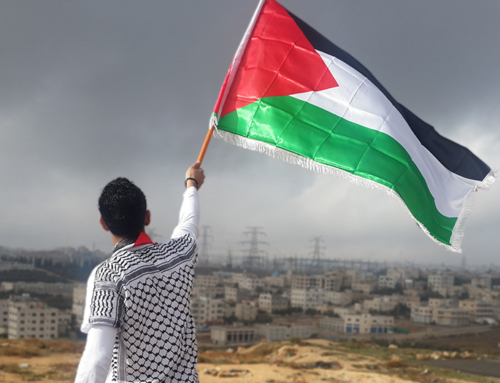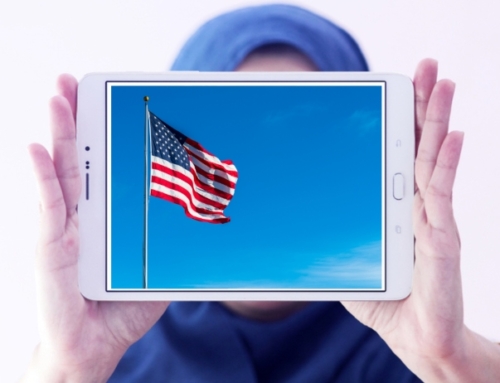By: Habeeba Husain
Empowering Faith Organizations Through Organic Farming
In an effort to highlight inspirational American Muslims, WhyIslam spoke with Hisham Moharram, a scientist turned activist entrepreneur. He began a community-owned, science-based, certified organic agribusiness called Good Tree Farm in New Egypt, N.J. The farm’s sister non-profit organization, The Good Tree, Inc., allows produce to be made available to the needy. Currently, Moharram is working on a crowdfunding campaign to empower faith organizations and faith-based schools through ownership in the local organic farm, access to fresh organic produce, and agribusiness apprenticeships. Read more about his project below.
Is Being an Arab American Muslim a Big Part of Your Identity?
Yes. Being a Muslim is my only identity. It trumps my Egyptian nationality by birth and American nationality by naturalization.
What is a Misconception That Really Gets Under Your Skin About Muslims?
That our faith teaches hate and violence. And that shariah (Islamic law) is some out-dated set of misogynistic laws that are inherently unfair.
What is Your Go-To Method to Combat Stereotypes and Islamophobia?
Living the values of my faith through The Good Tree Farm Project. It allows me to show and highlight many of Islam’s amazing positives and dispel many of the false claims and defamatory falsehoods that media and anti-Islam politicians and hate groups put in the average person’s mind.
Why Did You Start Good Tree Farm?
I started Good Tree Farm to empower the poor and show Islam’s values within the areas I could impact with a project like this. It was/is my way of fighting back against the hate and disinformation. Through the project and its focus on helping the poor and downtrodden, doing ‘what we can’ about pollution and climate change, showing an alternative food production system that is based on our Islamic values, and focusing on interfaith collaboration and cooperation—many of the negatives and false stereotypes mentioned earlier can be addressed.
I Saw Through Your Fundraising Page That You are Working Diligently to Empower Faith-Based Schools and Faith Organizations. Why Did You Want to Incorporate This Into Your Vision?
I am focused on giving ownership of the project to mosques and Islamic schools in inner cities and less affluent communities to give them advantages that life in this American society denies them and their kids. I wanted them to be empowered with income from this business when we get to the high return phase, and we are very close. That way, they can be independent of the constant fundraising most other mosques and Islamic schools have to do to pay bills and salaries, etc. Also, the youth of these communities are the most likely to ‘desire’ apprenticeships and internships in agribusiness enough to make the effort to come and learn at the farm and through our business activities and mentorship.
You Indicated Your Farm Provides a Neutral Space for Faith-based Schools and Organizations to Hold Interfaith Meetings, Among Many Other Activities. How Can This Help People to Learn More About Those Who are of Different Backgrounds?
Much of the bias and discrimination that people anywhere walk around with is caused by ignorance of ‘the other.’ People not like the majority and of different ethnicity, culture, race, or religion can easily be turned into the cause of problems the majority feels or suffers from. It is easy to make them scapegoats. In our masajid [plural for mosques], our non-Muslim visitors and our Muslim youth are less likely to ‘open up’ and say or ask sensitive topics so as not to be disrespectful, to avoid contentious arguments. or to avoid getting verbally slapped by the ‘elders’ of the masjid. But, at the farm, while working and enjoying growing food pretenses are dropped and people become more honest, frank, and direct. Youth can speak their minds and ask sensitive questions and raise controversial topics without fearing older community members being aggressive and judgmental. It is a neutral space where people can be candid and be themselves without fear of retribution.
Can you share an experience in your journey that is really dear or memorable to you when dealing with those of other faiths?
I presented at a Harvard University conference in 2016 and attended a closed group meeting of faith leaders in the justice in food and agriculture in California last month. At both events, I felt I was with ‘my people.’ They were not Muslims, but everything I held dear due to Islam’s teachings, they also held dear and wanted to act on. I felt more comfortable with those individuals than I ever felt with Muslims. My allies are more among non-Muslims than among Muslims, though I continue to try to change that Insha’Allah [God-willing].
What do You Consider Your Greatest Accomplishment so Far?
My greatest accomplishment so far is to have kept this project viable as a business and alive in terms of achieving my business plan objectives, despite the many challenges that caused 99.99% of other 2007 startups to fail (the 2007-2009 financial and housing crises, the 2009 fuel price increase crisis in which gas went from $1.25/gal to $4/gal, the four farming disaster declarations made by the N.J. governors due to climate extremes, Hurricane Irma, then Sandy which destroyed all our greenhouses causing me to rebuild all of them, and the very clear anti-Muslim bias ordinary customers displayed to me). I sacrificed a lot personally to maintain the project’s viability despite these challenges. Alhamdulillah [all praises are due to God], Allah helped me persevere. Now, we are succeeding at bringing in the communities I have targeted with the crowdfunding campaign. The Willingboro Muslim Educational Circle is now an owner in the project with shares in both the land owning LLC, and in the agribusiness LLC and they are growing their own crops in their greenhouse this season, Alhamdulillah. The next organization that is joining soon is the Cherry Hill Free Clinic, Insha’Allah. They will become invested in the next few days Insha’Allah.
What is One Thing You Want People to Know About You?
I want people to know that this is a project very much worth supporting with their donations and their purchases. The benefits are being passed on to exactly the right groups and communities who need help. It is a very worthy cause to support.
Is There Anything Else You Would Like to Add?
Two things I would like people to know about:
One:
Good Tree Farm has joined the international effort to combat climate change and is switching to Regenerative Organic Agriculture, instead of just the standard organic overseen by the USDA.
Two:
There is a growing movement in America’s faith groups to get involved in issues of social justice in healthy food access and reducing industrial agriculture caused climate change and pollution by bringing faith communities into these areas and engaging and empowering the youth. I and The Good Tree Farm Project are right there in the middle of it from the start.
Got Questions?
We have Answers. Get in touch now.








